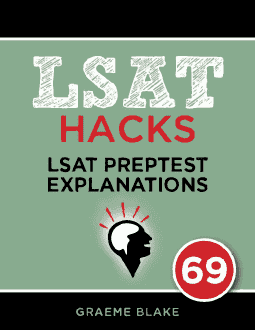QUESTION TEXT: In a test of fuel efficiency, car X and car Y yielded…
QUESTION TYPE: Parallel Reasoning
CONCLUSION: Car X is more efficient than car Y.
REASONING: The two cars had the same mileage, even though car X was driven less efficiently.
ANALYSIS: This is a good argument. Car X performed just as well as Y, even though X wasn’t used as efficiently.
So car X had spare capacity that could be used to make it even more efficient than Y, if car X was driven properly.
___________
- This isn’t a good argument. It’s possible X and Y experience pain the same way, but describe it differently.
- CORRECT. This is a good argument. Weight gain is like fuel efficiency. Eating more is like driving less efficiently. If our hamster ate fewer calories, presumably it would have gained less weight than the other hamster. Our hamster had spare calorie burning capacity.
- This argument would be more parallel if Ronald went the same speed coasting down the hill and pedaling on level ground. Then we might say he has more potential speed on the hill.As it is, he might already be coasting at his max speed down the hill.
- The estimates are only lower on average. It’s possible that the estimates matched in a few cases because both people knew a lot about
those particular pieces. So they could have had accurate estimates for those two, and be all over the map for everything else. - This makes an error between absolute level, and relative level.Let’s say you have 20/20 vision. You see well. You put on some mild prescription glasses. You see less well, but still pretty well, since you have good vision.Just because you do well with glasses on, doesn’t mean you do better with them on.


I thought of an easier way to solve this problem. I matched all the conclusion and realized that A, C, D, E all had a conclusion mismatch–all of the incorrect answer choices do not give us a correlation. Also, C, D, and E also gives conditionals in its conclusion, whereas the stimulus does not. Is that a bad way to go about this type of problem?
Maybe, I’d need more detail on what you’re referring to. A lot of things can be described in terms of being a conditional statement. For example, you could reword the conclusion of E to say “Thus, Jean gets better vision with glasses than without”
That’s pretty similar to wording of the conclusion in the stimulus. Would you say that the way I phrased it is a conditional? Or would you say the conclusion in the stimulus isn’t?
(Hint: You could say “If you’re car X –> Faster than Car Y” if you want to consider the conclusion as a conditional)
I’m not sure what you’re referring to re: correlations.
My advice is: be cautious of any solutions that eliminate answers for “having a factor” or “missing a factor”. That CAN work, but it’s also easy to make a mistake in what you’re looking for and incorrectly eliminate the right answer because you didn’t properly consider it.